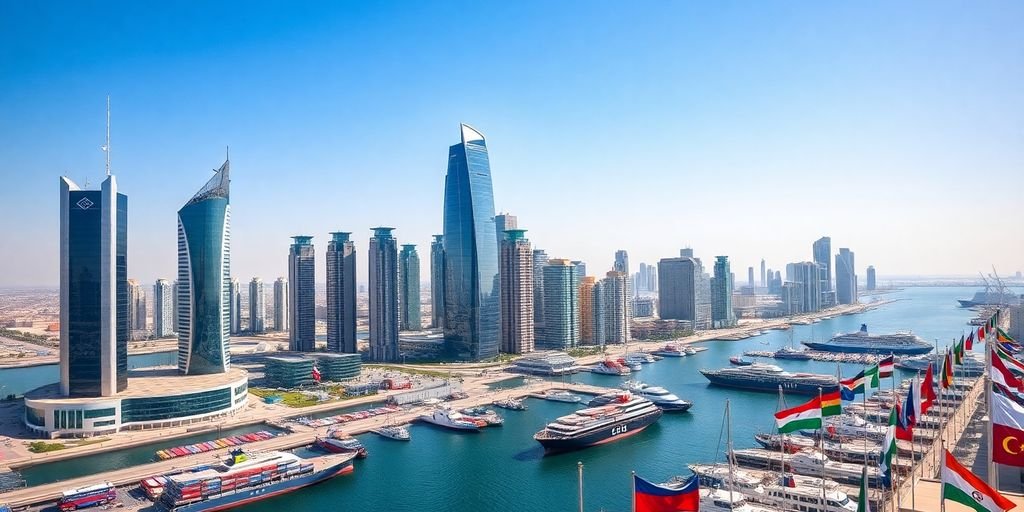The United Arab Emirates is significantly expanding its global economic footprint, forging stronger business ties across Asia, Africa, and Europe. Recent high-level delegations, strategic partnerships, and investment deals underscore the UAE’s ambition to become a central hub for international trade, finance, and technology, diversifying its economy and enhancing its influence on the world stage.
Deepening Ties with China and India
The UAE’s economic relationship with China is rapidly intensifying, with bilateral trade reaching approximately $104 billion in 2023. The UAE serves as a crucial re-export hub, with nearly two-thirds of China’s exports to Europe, Africa, and the Middle East passing through Dubai. This robust partnership is evidenced by:
- A 140-strong delegation from Abu Dhabi visiting China in mid-February, engaging with major Chinese companies like ByteDance, Xiaomi, and BYD.
- A 17.5% increase in Chinese companies operating in the Dubai Multi Commodities Centre (DMCC) last year, totaling over 950 active businesses.
- The launch of the Qingdao Overseas Integrated Service Centre to boost China-Arab trade, aiming for $400 billion.
Simultaneously, the UAE is strengthening its bond with India. The Federation of Indian Chambers of Commerce and Industry (FICCI), in partnership with Sharjah Airport International Free Zone (SAIF Zone), has organized B2B meetings to facilitate Indian businesses’ global expansion via the UAE. These initiatives leverage the India-UAE Comprehensive Economic Partnership Agreement (CEPA) to boost exports and cross-border operations, with strong interest from sectors such as engineering goods, food processing, textiles, and IT services.
Expanding Influence in Africa
The UAE is emerging as a dominant foreign player in Africa, filling investment voids left by other global powers. Since 2019, Emirati firms have announced $110 billion worth of deals on the continent, primarily targeting key economic and strategic sectors:
- Acquisition of a 51% stake in Zambia’s Mopani Copper Mines for over $1 billion by Emirati International Holding Company.
- Investments in ports, critical mineral mines, and large renewable energy projects across Africa.
- A partnership framework between Masdar, TotalEnergies, and 2PointZero to support clean energy in emerging markets and developing economies in Africa and Asia.
Strengthening European and Middle Eastern Partnerships
Beyond Asia and Africa, the UAE is solidifying its economic ties with European nations and regional neighbors:
- France: The UAE-France High-Level Business Council held its third meeting, resulting in partnerships across energy, renewable energy, infrastructure, and AI. Non-oil trade between the two countries increased by 21.3% in 2024, reaching approximately AED 44 billion. A landmark ‘UAE-France Framework for Cooperation in Artificial Intelligence’ Agreement aims to establish a 1-gigawatt AI complex with investments between €30 billion and €50 billion.
- Italy: A historic $40 billion investment deal was signed between Italy and the UAE.
- Iraq: The second UAE-Iraq Business Forum fostered stronger commercial ties, with over 170 companies participating and more than 250 B2B meetings conducted across sectors like energy, real estate, and AI. The first official session of the UAE-Iraq Business Council also took place.
- Syria: The UAE’s Al Habtoor Group is sending a business delegation to Syria.
- Armenia: Armenia’s state-run company will manage a UAE-led solar power plant.
- Laos: A landmark Laos-UAE Business Forum has ignited a new era of trade and investment.
These diverse engagements highlight the UAE’s strategic vision to diversify its economy, enhance its global connectivity, and establish itself as a pivotal player in international trade and investment.
Sources
- UAE sharpens focus on China for business growth, Arabian Gulf Business Insight | AGBI.
- FICCI Organises Successful B2B Meetings in Vijayawada to Promote Global Business Expansion through UAE, The Hans India.
- U.A.E. Is Pouring Money Into Africa, Seeking Resources and Power, The New York Times.
- The "UAE-France High-Level Business Council" meeting was held with the participation of over 50 entities to
Strengthen economic and investment cooperation., TotalEnergies.com. - Iraq and UAE strengthen economic ties at Dubai business forum, Iraqi News.
